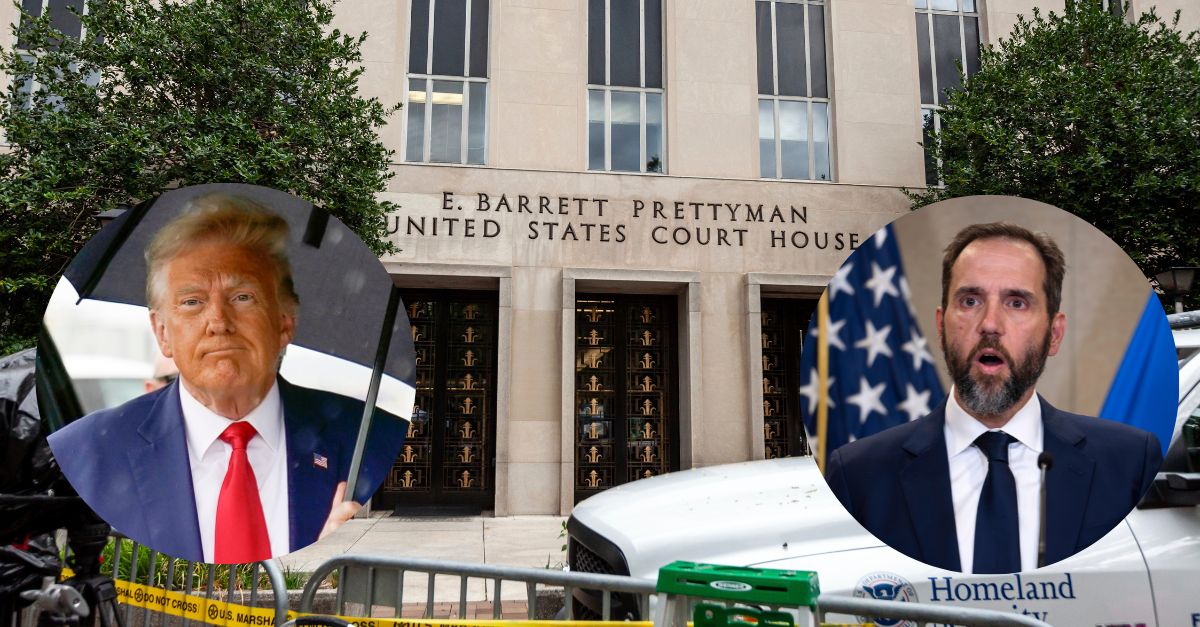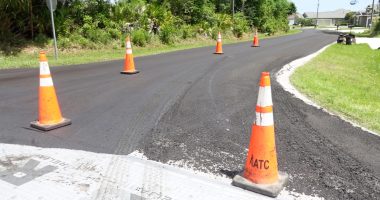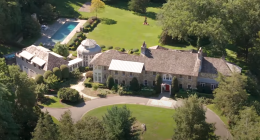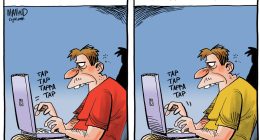
The E. Barrett Prettyman Courthouse stands behind barricades and police tape in Washington, DC, prior to Donald Trump’s arraignment for his role in the January 6, 2021 Capitol insurrection and other efforts to overturn the results of the 2020 presidential election. (Photo by Allison Bailey/AP). Inset left: Trump walks to speak with reporters before boarding his plane at Ronald Reagan Washington National Airport, Aug. 3, 2023, in Arlington, Va. (AP Photo/Alex Brandon, File). Inset right: Special Counsel Jack Smith speaks to the media about the indictment of former President Donald Trump, Aug. 1, 2023, at an office of the Department of Justice in Washington. (AP Photo/J. Scott Applewhite, File)
Attorneys for former President Donald Trump have responded to a request from federal prosecutors asking a federal judge for a protective order in the criminal case against him for his alleged efforts to subvert the results of the 2020 presidential election, accusing the government of trying to violate the defendant’s First Amendment rights and engaging in political posturing.
“[T]he government requests the Court assume the role of censor and impose content-based regulations on President Trump’s political speech that would forbid him from publicly discussing or disclosing all non-public documents produced by the government, including both purportedly sensitive materials and non-sensitive, potentially exculpatory documents,” the filing says (citations omitted).
Instead, Trump’s lawyers propose that the protective order be narrowed “to shield only genuinely sensitive materials from public view,” which they say would be “consistent with other protective orders entered by this Court in cases concerning the events of January 6, 2021[.]”
Trump faces four criminal counts tied to an alleged conspiracy to subvert the result of the 2020 election and pass off fake electors in key swing states. He entered a not guilty plea last week and was told at his arraignment by U.S. Magistrate Judge Moxila Upadhyaya that he was not to communicate the facts of the case with any individual known to be a witness, except through counsel or in the presence of counsel.
Trump’s legal team describes the case as “a trial about First Amendment rights” and accuses the government of seeing to “restrict First Amendment rights” of “its administration’s primary political opponent, during an election season[.]”
Trump’s legal team complained that it was unfairly rushed to respond to the government’s motion, and said that the government was slow in responding to Trump’s request to discuss possible solutions. In a footnote, Trump’s attorneys said that federal criminal procedure rules governing the time allowed to respond to motions are meant to prevent such “chaotic events,” and then strongly implied that in shortening the deadline, the judge herself violated Trump’s due process rights.
“Without doubt, the Court’s decision to vary from the default Local Rules and allow President Trump less than one business day to respond to this important Motion is a concerning development, inconsistent with his due process rights,” the motion says.
The request for the protective order from Special Counsel Jack Smith’s team arrived Friday — just a day after Trump appeared in federal court in Washington, D.C. — and after the thrice-indicted, twice-impeached former president took to his social media forum, Truth Social, to issue what appeared to be a revenge-seeking threat.
“[I]n recent days, regarding this case, the defendant has issued multiple posts — either specifically or by implication — including the following, which the defendant posted just hours ago,” prosecutors Thomas Windom and Molly Gaston wrote in their request to U.S. District Judge Tanya Chutkan before including a screenshot of the post in question, which proclaims: “If you go after me, I’m coming after you!”

via FBI court filing
Given the messages and their potential chilling effect on possible witnesses, prosecutors urged Chutkan — who now presides over the case since Trump’s arraignment — to set some restriction that would keep the former president from speaking publicly about details. One of the restrictions would prohibit Trump’s attorneys from giving the former president any discovery records that are deemed highly sensitive, such as grand jury materials that led to this latest indictment.
Read Related Also: ‘They should have investigated this’: Attorneys slam ‘pure unbridled arrogance’ of police after video exonerates man charged with murder of girlfriend who killed herself
Trump’s lawyers dismiss the government’s concerns over this post, arguing that it “does not contain or reference sensitive information of any kind. Rather, it is generalized political speech, not directed to this case.”
The Trump legal team notes that the former president’s campaign said that the post was “in response to the RINO, China loving, dishonest special interest groups and Super PACs, like the ones funded by the Koch brothers and the Club for No Growth,” and not linked to the indictment against him.
The defense lawyers also say that there is “no alignment” between the post and the government’s proposed protective order, which “would not prohibit the post.”
Trump, who is represented by attorneys John Lauro and Todd Blanche, attempted on Saturday to seek a delay beyond Monday afternoon to respond to the special counsel’s request but Chutkan promptly denied that request.
And now, on a Saturday, (appearing unwilling to waste much time) Judge Chutkan has given Donald Trump until 5pm ET Monday to respond to the special counsel’s motion for a protective order following Trump’s ostensible threat post on social media: pic.twitter.com/9oyPfjvSc6
— Brandi Buchman (@Brandi_Buchman) August 5, 2023
Upadhyaya’s instruction limiting Trump’s communication about the case with anyone involved without lawyers present is standard fare for a defendant at arraignment.
And also typical in criminal matters are processes for routine discovery. Before a trial, prosecutors must turn over discovery to the defendant and their lawyers. A number of documents can be included in this; everything from photographic or video footage to notes, grand jury documents, or witness statements. Virtually anything that has relevant information to the case can fall under the discovery umbrella. These records can also feature highly sensitive information depending on the circumstances or can contain confidential or in some cases, classified information.
Important to note is that a protective order does not gag, or silence, a person. Instead, it is inherently meant to protect discovery and the integrity of the case.
You can read the filing, below.
Have a tip we should know? [email protected]







